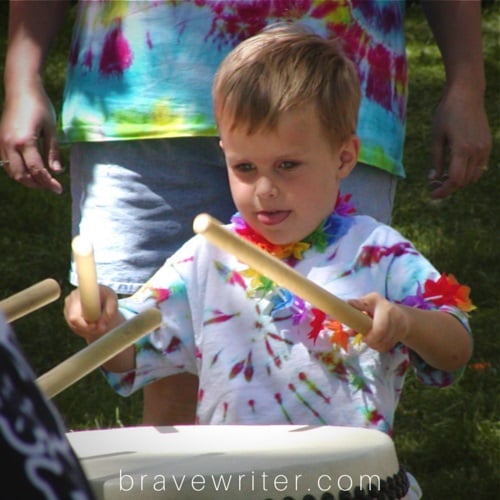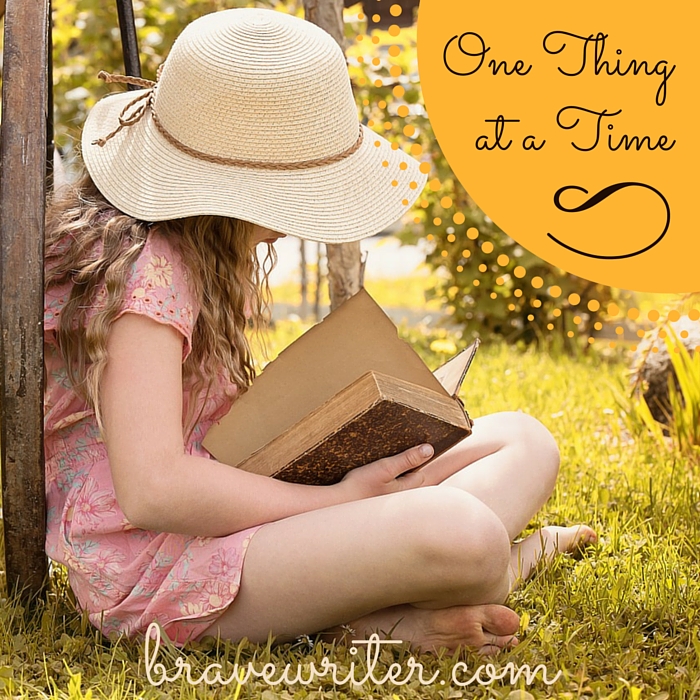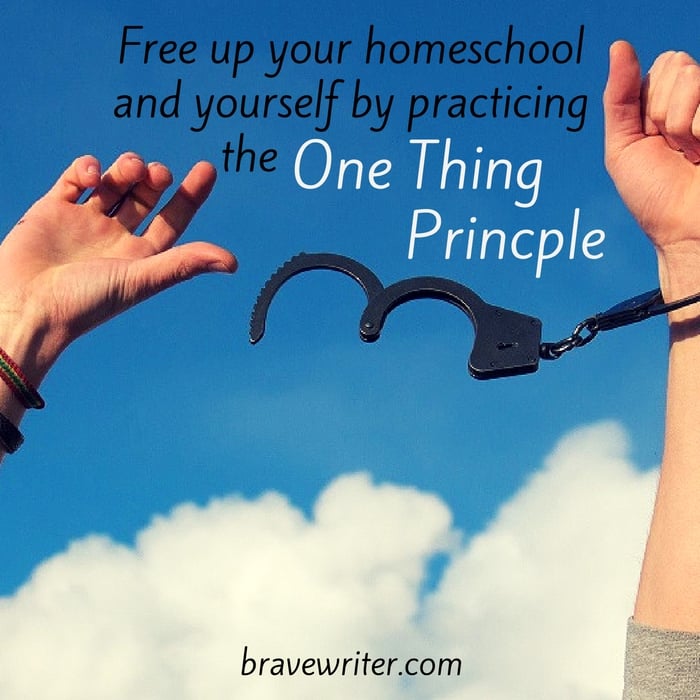The Brave Writer Lifestyle may be in danger of becoming a group of words that lose meaning. When I first chose the word “lifestyle” to express the kind of language arts and writing environment that I hope families can create, I did so because I wanted to undercut the negative associations with the word “curriculum.”
“Lifestyle” is a routine or habit of being that relishes good books, writing, poetry, language, talking, movie viewing, and listening. These habits of being will foster better spelling, deeper readings, insight into stories and plots, an appreciation for good writing, an ability to translate one’s thoughts into written expression, a sophisticated vocabulary, interest in languages, (especially one’s own), openness to all kinds of writing genres (including poetry, plays, fiction and non-fiction), and a general love for the language arts.
Because we use the term “lifestyle” so much around here, it might become just the third word in the trio that substitutes for what others might see as a curriculum.
A writing curriculum or a language arts program is geared toward mastering skills. They may, as a by-product, help you to deconstruct difficult grammar, discover a wonderful book or teach helpful writing techniques. Additionally, a program offers structure and a linear step-by-step measurement of movement forward. This is why curricula and programs will never completely fall out of fashion and have their place! But they are not a lifestyle.
Brave Writer offers a different vision. We have certain practices we recommend that have proven beneficial for grammar and spelling, for writing and narrating. But they are simply that: habits or practices. They can be used to advantage or skipped for a time while a child investigates some other aspect of language or writing. You can use programs and curricula to support you in a targeted area of language arts or writing instruction (like an online class, or programs like the Arrow or Boomerang). But these are supports to the lifestyle, not substitutes for it.
A lifestyle implies habit and fluidity, routine and flexibility. You get to decide what is working and what is not.
For those who are “‘tweens” – between curricula and the vision of a lifestyle – let me offer you a single suggestion for how to embrace the lifestyle as you reorient yourselves.
Start with ONE thing.
 Pick one activity or habit or practice or idea that sounds fun to you and do that first. Do it well. Don’t add to it.
Pick one activity or habit or practice or idea that sounds fun to you and do that first. Do it well. Don’t add to it.
So if you want to read poetry with your kids, go to the library and find a good poetry book. Just get a poetry book. Don’t get sixteen other books to read.
Share the book with your kids. Leave it on the coffee table. Read it at bedtime or with tea or during dinner. Let your kids read and hold it. Mark your favorite poems with bookmarks and reread them. Memorize a poem. Write one each morning on the white board. Write a poem in a notecard and keep it in your pocket all day, then reread it in the morning, in the grocery line and before you make dinner.
Enjoy poetry.
Too often we rush through the ideas on our list of good ideas and then wonder why nothing is taking hold. Stop. Read the ONE book and see how much you can get out of it for a week.
Maybe you’ll illustrate poems, or copy them over, or read them at the dentist’s office, or memorize one to share with visiting relatives. Maybe you’ll want to write a poem yourself. Maybe your kids will. Maybe this book will lead you to another book of poems or to one single poet. Let it do its work. Don’t force it.
The point is that if you make poetry just one of the many things you must do this week to achieve the “Brave Writer Lifestyle,” you may not enjoy the poetry. You might find yourself thinking about how after you read the poetry book, you ought to be copying quotes into copy books. And what about freewriting? And will that subscription to the Arrow turn out to be worth it? Suddenly your mind is off of the poem and on “curriculum planning.”
Don’t fall for that trap.
Slow down. Start with one thing. You can build on one good experience. You’ll find that one positive language arts experience enriches the whole. Perhaps the poem you read will naturally lend itself to a discussion of theme (Gerard Manley Hopkins), or grammar (Lewis Carroll), or word choice (Jack Prelutsky), or even a historical moment that gives context to the poet’s writing (Langston Hughes).
When you have exhausted the poetry book, pick the next enticing idea. (Don’t pick the one you think you should pick – I give you permission to follow your enthusiasm.) Enjoy it. Live it.
Follow these steps:
- Prepare for the experience (get the book, buy the ingredients for a recipe for teatime, read ahead in the novel, order the film from Netflix – whatever the activity is).
- Set up the experience for success by picking a date and planning to execute it that day. Clear your day of other burdens. Focus.
- BE HERE NOW – while you are in the experience, don’t let your mind wander to math or orthodontist appointments or bills. Unplug the phone, turn the ringer off your cell, close the laptop. Enjoy what you are doing and do it fully, without guilt.
- Reminisce. When the experience ends, a few days later, talk about it. Remember what was enjoyable. Say it out loud, to your kids, to your friends. Write it up in a blog or email your mother. Be sure to validate the positive experience so that it becomes a memory to treasure and share.
You might notice that these steps work great for teatimes or trips to the art museum. What about something more philosophical like, listening attentively to your children? Start by thinking of all the ways you can be a better listener. Can you take one child out for coffee, another on a walk, swim with one at the Y, see a movie and then chat about it on the way home with yet another?
Do it! It counts. See where it leads.
Can you choose to sit on the couch for a minute today with one child? Might it work to put one child to bed and to lie on that bed for fifteen minutes to cuddle and converse? Do it! Plan it, set it up for success, be fully in the moment and then remember the good that came from it.
You can’t plan time for listening and then fill up your days with lots of busy work. Focus on listening and let that be the frame of reference for everything you do that week.
Allow this year to be the one where you taste-test all the great ideas. Some will stick. Some will bomb. The ones that energize you and your kids will become natural habits because they make you and your kids happy, and you see fruit in their lives.
After many months, you will find that you have a lifestyle all your own.
Images: boy drumming by Bev Sykes and library by Enokson (cc cropped, text added)

























